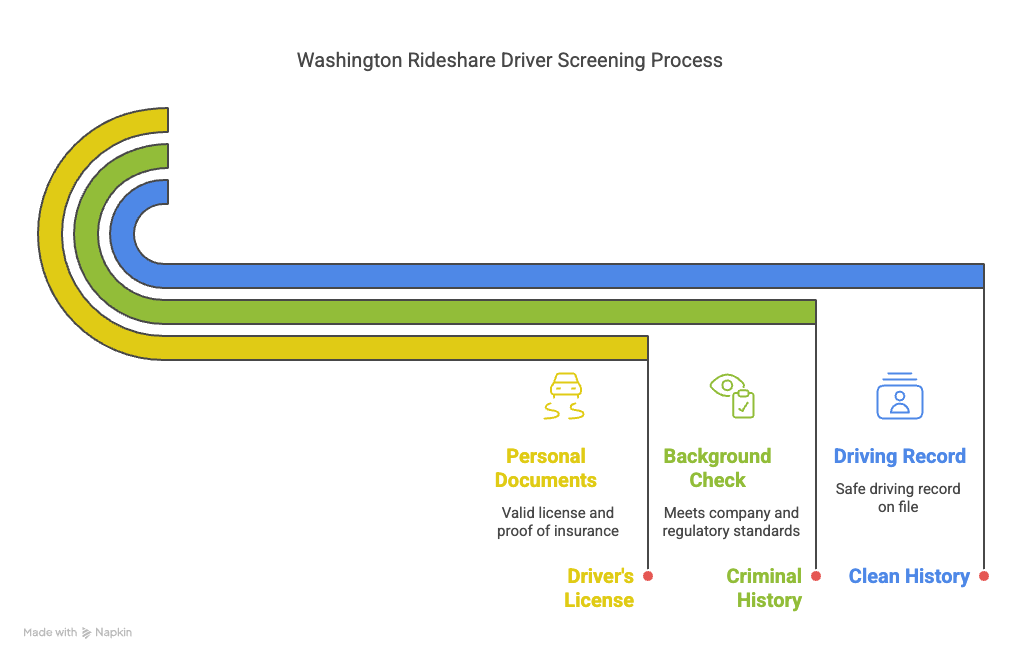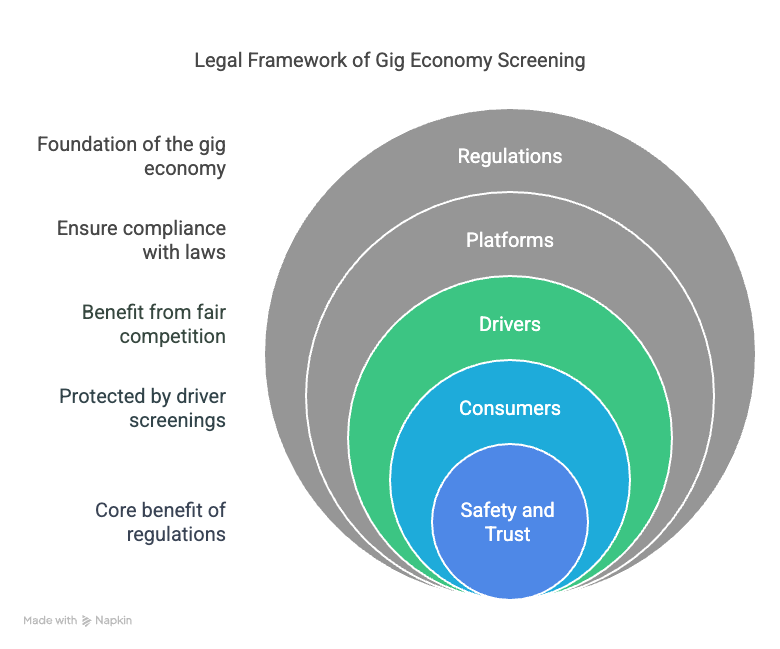In the bustling streets of Washington, the gig economy thrives with the likes of Uber, Lyft, and various delivery services offering flexible employment options. Whether you're driving passengers across town or delivering a piping hot meal, these roles are pivotal in keeping the city moving. But with great opportunity comes responsibilityâensuring the safety and reliability of these services, both for drivers and consumers. This is where Washington gig economy checks come into play.
This guide delves deep into the screening processes for gig economy workers in Washington, providing insights for current and prospective drivers. We will explore the importance of these checks, the specific requirements for different platforms like rideshare and food delivery services, and what you need to know to comply with them.
Key Takeaways
- Gig economy checks in Washington are crucial for ensuring driver and consumer safety by thoroughly assessing driving records and criminal backgrounds.
- Rideshare services like Uber and Lyft require drivers to meet specific age and vehicle criteria, along with passing detailed background checks.
- Food delivery platforms have simpler vehicle requirements but still conduct background checks, impacting eligibility and compliance with legal standards.
- Washington's laws on gig economy screening promote safety and fairness, requiring thorough checks on driving and criminal history.
- Preparation with accurate documents and a clean record improves your chances of passing gig economy checks, ensuring success in this growing industry.
Introduction
In Washington, the gig economy is more than just a buzzwordâit's a way of life. Millions rely on services like Uber, Lyft, and various delivery platforms daily, whether they're commuting or ordering dinner. As a driver in this fast-paced environment, understanding gig economy checks isn't just advisable; it's essential for maintaining trust and ensuring safety.
This guide is here to demystify the screening processes that accompany gigs in Washington. Whether you're a driver or a consumer, knowing how these checks work can help you navigate the world of gig employment more effectively. For drivers, meeting the required standards is crucialâit's not just about getting approved; it's about staying approved. Understanding what these checks entail could be the difference between a thriving gig career and a halted journey.
Gig economy checks in Washington involve examining driving records, criminal backgrounds, and more. These wheels turn behind the scenes but have substantial effects on worker eligibility and consumer confidence. By the end of this guide, you will grasp the mechanics of these screenings, empowering you to make informed decisions and anticipate the requirements of your role.
Understanding Washington Gig Economy Checks
When you think about the gig economy, you probably picture rideshare and delivery services. In Washington, this is a major part of the employment landscape. People connect with companies like Uber, Lyft, and DoorDash to make money while enjoying flexible hours. But to keep the system trustworthy and safe, thorough screening processes are essential.

Why are these checks important? As a potential driver, you want to ensure your passengers or deliveries arrive safely. Consumers also want to feel secure when using these services. Screening builds this trust. Itâs about validating that you can safely maneuver the busy streets of Washington and have a good track record.
Washington gig economy checks involve several steps. First, there's the driving record. Companies need to know youâve got a clean history on the road. Speeding tickets or accidents might raise red flags. Then comes the background check. This examines criminal history to ensure you meet company and regulatory standards. Both Uber and Lyft have specific criteria youâll need to meet.
You'll also need to present personal documents. Think of your driverâs license, vehicle registration, and proof of insurance. Having these ready can speed up the process.
The result? A safer environment for everyone involved. These checks aren't just hurdlesâtheyâre gateways to ensure you are part of a reliable system. As you embark on this journey, consider these processes as important steps toward improving your credibility and securing work opportunities. Ask yourself: are you ready to meet these expectations? Prioritize preparation, and you'll find the screening process much smoother.
WA Rideshare Screening: Uber and Lyft
For those looking to drive for Uber or Lyft in Washington, understanding the eligibility requirements is crucial. To start, you need to meet specific age criteria. Both platforms generally require drivers to be at least 21 years old, although this can vary slightly depending on local regulations.
Another important factor is your vehicle. Uber and Lyft have set standards that your car must meet. It should be under a certain ageâoften not more than 10-15 years old. The vehicle must also pass inspection to ensure itâs in good condition. Additionally, valid insurance covering ride-sharing activities is non-negotiable.
Background checks are a cornerstone of the rideshare industry for good reason. They help maintain safety and confidence among both drivers and passengers. The checks typically involve a detailed assessment of your driving history and criminal record. Expect your driving record to be scrutinized for violations or accidents. Meanwhile, the criminal background check will look for any serious offenses, particularly convictions related to violence, theft, or drugs. A clean background is essential for your approval as a driver.
Once you're up and running, the monitoring doesn't stop. Uber and Lyft continue to review driver compliance through ongoing evaluations. This ensures all drivers maintain high standards, both in safety and conduct.
Preparing for the screening process involves a few steps. After submitting your application, the company will conduct multiple checks. The timeline can vary, but it typically takes several days to a couple of weeks. Patience and attention to detail will serve you well here. Keep an eye on your application status, and make sure all your submitted documents are correct and complete to avoid unnecessary delays.
Getting through the rideshare screening process might seem overwhelming, but itâs a necessary step toward joining the vibrant gig economy in Washington. By understanding each requirement and approaching the process systematically, you can pave the way for your success as a rideshare driver.
Food Delivery Checks in Washington
Food delivery services like UberEats, DoorDash, and Grubhub are key players in Washington's gig economy. Each platform has specific screening requirements. Let's look at what it takes to become a food delivery driver.
First, you'll need to meet basic qualifications. A valid driver's license and insurance are mandatory. Make sure your vehicle meets the platform's standards. These are generally less stringent than rideshare requirements, focusing more on food safety than on passenger safety.
The age requirement is generally 18 or older, unlike rideshare services that often require you to be 21. Some platforms also let you deliver by bike, scooter, or on foot.
Unlike rideshare screening, food delivery checks may not emphasize detailed vehicle inspections. However, they do require background checks, looking at criminal history to ensure consumer safety.
Washington's local laws also impact these processes. Delivery services must comply with minimum wage laws, and this compliance can affect screening, as companies ensure they can manage costs while meeting legal standards.
Understanding these checks can guide you in securing a food delivery role, ensuring you're compliant, and maintaining customer trust. Are you ready to meet the challenge of delivering great service in Washington's dynamic food delivery sector?
The Legal Landscape of Gig Economy Screening
The laws around gig economy screening in Washington focus on balanceâprotecting consumers while supporting fair working conditions for drivers. At the heart of this balance are regulations that set standards for driver eligibility and instill confidence in the services provided.
Washington state law mandates that companies like Uber, Lyft, and delivery services conduct thorough background checks on drivers. This includes reviewing criminal records, driving history, and ensuring compliance with age and vehicle standards. The aim? Safety for all involved. For instance, rideshare drivers must pass fingerprint-based checks, a requirement set by law to reduce risks for passengers.
But how do these laws serve you as a driver? They create a transparent framework where everyone plays by the same rules. This not only levels the playing field but also reduces liability for honest drivers. You are assured that competitors meet the same standards, a significant aspect in a crowded gig market.

For consumers, these laws form a protective barrier. By requiring comprehensive screenings, the state minimizes the likelihood of hiring drivers with unsafe records. As a result, you can trust the person behind the wheel or the delivery handling your order.
Itâs crucial to stay informed about these regulations. Changes in state laws or local ordinances can adjust requirements, affecting your eligibility. Platforms often provide updates, but you can look to local government websites or industry newsletters for the latest information. Keeping abreast of these changes helps you maintain your standing and readiness to work.
Investing time in understanding and adhering to these legal standards not only protects your gig economy presence but enhances the overall trust in these servicesâbenefiting everyone involved.
Preparing for Gig Economy Checks
Getting ready for gig economy checks involves gathering the right paperwork and understanding what the platforms require. Start by assembling key documents: a valid driverâs license, proof of insurance, and vehicle registration. Ensure these are up-to-date; platforms like Uber and DoorDash wonât proceed without them.
Double-check your driving record. Many companies consider speeding tickets or major violations disqualifiers. If youâve had issues, address them before applying. You can request a copy of your driving record from the Department of Motor Vehicles. This gives you time to correct errors or prepare explanations if necessary.
Keeping a clean record extends beyond paperwork. Avoid infractions and maintain good standing with past employers. Having references or a history of reliable work can support your application.
Mistakes are common in applications. Failing to disclose past violations or incomplete forms are frequent errors. Lapses in honesty can lead to instant rejection. Take time to read application questions carefully, and answer truthfully.
Consider timing. Seasonal demands might speed up the process, but outside these periods, expect longer wait times. Planning ahead helps to avoid frustration.
Preparation boosts your chances. With the right documents, a clean record, and careful attention to detail, youâll be ready for gig economy work in Washington.
Conclusion
Gig economy checks are not just a formality; they're crucial for maintaining the quality and safety that everyoneâdrivers and consumers alikeârelies on. By ensuring that drivers meet specific criteria, screening processes help uphold the trust that keeps the gig economy ticking. Whether you're new to these roles or a seasoned driver, using these checks to your advantage is a step toward professionalism.
Compliance is more than a requirementâit's your alignment with a standard that safeguards everyone involved. It's easy to see these screenings as hurdles, but consider them pathways that enable you to perform at your best and earn trust within the community.
In Washington's gig economy, your role as a driver or delivery worker goes beyond the task. You contribute to the vibrant flow of life in the cityâmoving people and goods quickly and efficiently. Every trip you make and every meal you deliver pulls together the threads of commerce and connectivity, making the city a bit more accessible for everyone. So buckle up, and let these checks guide you toward making a positive impact.
Frequently Asked Questions (FAQs)
What disqualifies you from Uber in WA?
Uber may disqualify you due to past criminal convictions, especially violent crimes or sexual offenses. A driving record with recent major violations like DUI or reckless driving can also be a disqualifier.
Does Lyft check criminal history in Washington?
Yes, Lyft conducts criminal background checks in Washington as part of the application process to ensure passenger safety.
Can a DUI affect gig work in WA?
Yes, a DUI can affect your eligibility for gig work in Washington. It may disqualify you from driving for companies like Uber and Lyft, depending on how recent the offense is.
How often do gig companies recheck backgrounds in WA?
Gig companies typically recheck backgrounds annually to ensure ongoing compliance with their safety standards.
Are WA gig workers considered employees?
In Washington, gig workers are usually classified as independent contractors, not employees. This classification affects benefits and protections.
Can you appeal a gig check denial in WA?
Yes, you can appeal a background check denial by contacting the specific gig company for guidance on their appeal process.
Do gig companies check credit history in Washington?
Most gig companies do not check your credit history as part of the application process. They focus more on criminal and driving records.
How far back do Uber checks go in WA?
Uber typically reviews criminal records for the past seven years, though this can vary based on specific circumstances and state regulations.
Are misdemeanors a problem for gig work in WA?
Misdemeanors may not automatically disqualify you, but serious or recent charges could impact your eligibility for certain gig opportunities.
Do delivery drivers need fingerprinting in Washington?
Fingerprinting isnât usually required for delivery drivers in Washington, but it might be necessary for other types of background checks or specific roles.
What documents do you need to apply for gig work?
You generally need a valid driver's license, vehicle registration, and proof of insurance. Additional documents may be requested depending on the service.
How can you maximize your earnings in gig work?
You can increase earnings by working during peak hours, maintaining a high customer rating, and seeking bonuses or incentives offered by the platforms.
What happens if you experience technical issues while working?
Most gig companies provide support or emergency contact options through their apps to assist with technical issues while on a job.
Are there specific vehicle requirements for drivers in WA?
Yes, there are vehicle requirements like the age of the car and the number of doors. These requirements can vary between platforms, so check their guidelines.
Definitions
Background Check
A background check reviews your personal history to determine your eligibility for a job. Gig companies like Uber and DoorDash use this to verify criminal records, driving offenses, and other public data. A clean background helps you get approved. If thereâs something on your record, honesty and explanation can help during the review.
Driving Record
Your driving record shows your behavior behind the wheel. It includes tickets, accidents, license suspensions, and DUIs. Companies use it to judge how safe you are on the road. Multiple violations can stop your application. You can request a copy from your stateâs DMV before applying.
Eligibility
Eligibility defines whether you meet the basic requirements to work. For gig driving in Washington, this includes things like age, driverâs license, insurance, and a background check. Each platform lists specific criteria. If you miss one, your application may get delayed or rejected.
Screening Process
The screening process is a series of checks you go through when applying to a gig platform. It typically includes your personal information, driving record, criminal background, and vehicle details. The goal is to confirm that you meet the company's safety and legal standards. Being organized can make this go faster.
Compliance
Compliance means following the rules and meeting official standards. Gig drivers must comply with laws on insurance, minimum wage, and background checks. It protects you from legal trouble and shows the company youâre accountable. Staying compliant helps you maintain access to work on the platform.
References
- https://ogletree.com/insights-resources/blog-posts/washingtons-new-law-presents-sweeping-changes-to-gig-economy/
- https://www.insurance.wa.gov/gig-workers-and-delivery-drivers
- https://oversharing.substack.com/p/gig-workers-regain-some-dignity-in

GCheck Editorial Team
Meet the GCheck Editorial Team, your trusted source for insightful and up-to-date information in the world of employment background checks. Committed to delivering the latest trends, best practices, and industry insights, our team is dedicated to keeping you informed.
With a passion for ensuring accuracy, compliance, and efficiency in background screening, we are your go-to experts in the field. Stay tuned for our comprehensive articles, guides, and analysis, designed to empower businesses and individuals with the knowledge they need to make informed decisions.
At GCheck, we're here to guide you through the complexities of background checks, every step of the way.





